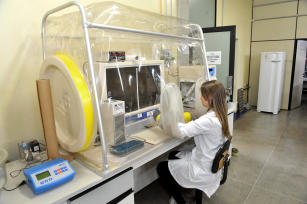Prospecting and isolation of rumen fibrolitic microorganisms
Prospecting and isolation of rumen fibrolitic microorganisms

Photo: Nicoline, Humberto
Ethanol production from lignocellulosic biomass corresponds to the second generation of biofuels, and is a promising technology under development. The cost of the enzymes for the enzymatic hydrolysis is one of the major constraints for obtaining second generation ethanol. Therefore, the search for new technologies for increasing ethanol production should be focused on organisms capable of synthesizing enzymes involved in the degradation of plant fiber, i.e. the degradation of cellulose, hemicellulose and lignin, which are main constituents of these fibrous materials. The microorganisms in the rumen of cattle are a promising alternative, since this microbiota can be a potential source of organisms carrying enzymes involved in the degradation of the lignocellulosic fiber. This project aims to purify and characterize cellulolytic and xylanolytic enzymes produced by the rumen microbiota of cattle fed a diet rich in structural carbohydrates. The procedures for isolating fibrolytic microorganisms are performed using specific conditions and culture media described in the literature. After this stage, the project will identify through sequencing 16S rRNA for bacteria and 18S rDNA for fungi. The community of rumen microorganisms will be identified by means of metagenomics. The fibrolytic enzymes will be purified and characterized. The goal is to evaluate 10% of the microorganisms showing higher potential to produce fibrolytic enzymes. The enzymes will be characterized by their molecular weight and enzymatic activity in the laboratories of Embrapa Dairy Cattle and Embrapa Goats & Sheep, and the enzyme activity compared to commercial enzyme extract at Embrapa Agroenergy. As a final product of the project, it is expected to obtain cellulolytic and xylanolytic enzymes characterized from the five pre-selected isolates. In a future project it may be possible to the genes encoding the isolated enzymes so that the former can be cloned into microorganisms most commonly used in the industry. The isolated microorganisms will be incorporated in the collection managed by Embrapa’s project "Microorganisms of interest for dairy agribusiness" for further studies, with the potential to interact with other institutions and assembly of a research network on rumen microbiology, ruminant nutrition or yet other areas. The generated knowledge will serve as bedrock for the development of innovative technologies for the utilization of biomass, as for the biofuels industry (second generation ethanol) or tropical cattle raising.
Ecosystem: Coastal Areas, Atlantic Forest, Cerrados Region
Status: Completed Start date: Tue Jul 01 00:00:00 GMT-03:00 2014 Conclusion date: Fri Mar 31 00:00:00 GMT-03:00 2017
Head Unit: Embrapa Dairy Cattle
Project leader: Jailton da Costa Carneiro
Contact: jailton.carneiro@embrapa.br
Keywords: bioetanol, enzima xilanolítica, enzima celulolítica
